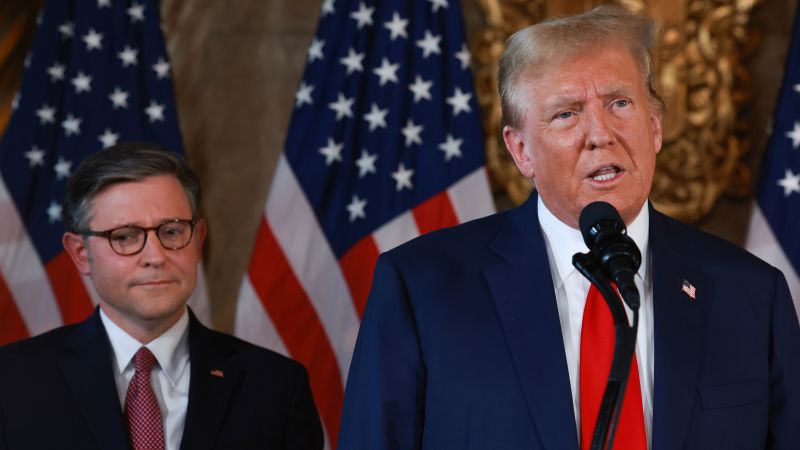In recent developments, former President Donald Trump expressed a willingness to consider increased taxes on affluent Americans as part of a comprehensive tax and spending reform package pursued by Republican lawmakers in Congress. This issue, however, is far from settled and continues to stir contention within the GOP ranks on Capitol Hill.
Trump’s message was conveyed through a post on Truth Social, where he posited that he would “graciously accept” a “TINY” tax bump for the wealthy. However, he acknowledged the potential political pitfalls associated with such a move for Republican lawmakers. This opens up a complex dialogue as they strive to identify approximately $1.5 trillion in spending cuts needed to balance out substantial tax reductions amounting to trillions of dollars. The challenge is significant given the current fiscal landscape and the pressure to achieve a workable solution that satisfies various factions within the party.
In his social media post, Trump recounted the infamous phrase “Read my lips” from former President George H.W. Bush, which he attributed to contributing to Bush’s electoral defeat. Trump emphasized that the backlash from the left, particularly among “Radical Left Democrat Lunatics,” could hinder progress if Republicans pursue tax increases, even minor ones designed to benefit lower and middle-class workers. Trump claimed that many in his circle would ultimately back the proposal, despite suggesting that Republicans should likely refrain from such actions.
Further complicating the issue, during a conversation with House Speaker Mike Johnson, Trump floated the idea of allowing tax cuts for high earners to expire. This would target individuals making more than $2.5 million and couples exceeding $5 million, a strategy intended not only to generate necessary funds but also to counteract Democratic arguments about tax cuts benefiting the wealthy few.
This is not the first time Trump’s stance on taxation has appeared contradictory. In the past, he campaigned vigorously on reducing taxes for the rich, but more recently, he has indicated that he is amenable to discussions regarding higher taxes on high-income earners. He even remarked to Time magazine that he found the idea of raising taxes on those earning over $1 million appealing. However, such sentiments have not initialized widespread enthusiasm within the House GOP and remain uncertain in terms of inclusion in the envisioned tax overhaul plan, dubbed “one big beautiful” bill, aimed at cementing the 2017 Trump tax cuts and eliminating taxes on tips and other income streams.
Republicans face a daunting task in negotiating these changes, as extending the 2017 individual tax cuts, set to expire soon, may exceed $4 trillion in cost. Additional fractures exist among GOP lawmakers regarding necessary reduction measures concerning significant social programs, like Medicaid and food assistance, which adds to the intricacies.
Proposed solutions within the House Ways and Means Committee include letting tax breaks for the wealthiest Americans lapse, potentially raising their maximum income tax rate from 37% back to 39.6%. Such a move could receive pushback from individual members concerned about potential negative impacts on small business owners. However, this measure could affect approximately 1.5 million households and yield about $409 billion in revenue, though experts caution that it might stifle medium-term economic growth.
An alternative proposition involves establishing a new tax bracket targeting the wealthiest, allowing the proposal to offset costlier provisions in the tax reform package, including the prolonged state and local tax deduction (SALT). Estimates from the Tax Foundation suggest this new bracket could generate around $59.3 billion over a decade while affecting a smaller group of 150,000 to 200,000 households.
With the complexity of taxation under scrutiny, Republican leaders must contend with various implications of changes that would limit benefits to the wealthy or increase revenue. Despite Trump’s open stance, economic adviser Kevin Hassett downplayed the push for higher taxes on the rich, reiterating the president’s preference for opposing such measures in favor of policies that would maintain more favorable conditions for all taxpayers.
As the GOP continues to navigate these taxing waters, discussions surrounding the funding mechanisms for their proposals remain fundamentally tethered to maintaining a cohesive stance within their party, balancing priorities, and managing the expectations of constituents. A meeting between House Ways and Means Chair Jason Smith and Trump to discuss tax frameworks will further shed light on the party’s strategy moving forward and how they plan to align diverse interests ahead of future votes.



